A Dead Humpback, a Team of Scientists, a Race for Answers
Did noise pollution in the ocean contribute to her death in the waters off Cape Cod? Her ears may hold important clues.
“It’s sad when any animal dies.” But a mature humpback whale with tissues and organs intact is “an incredible gift to knowledge.”
Darlene Ketten, a marine biologist at Boston University, was making dinner on a Sunday night in early May when she got an email from a friend at the Woods Hole Oceanographic Institution. In the waters off Cape Cod’s northern tip, a humpback whale had been found dead. And not just any whale: a 40-ton female that Provincetown researchers had tracked since she first appeared offshore in 1984. They followed her through adolescence, motherhood—she’d had at least five calves—and maturity. They named her Vector, and the distinctive black-and-white markings on her tail, or fluke, became known to whale enthusiasts from Cape Cod to Canada.
In a city where the thrill of whale watching lures tourists and Bostonians out to sea all summer long, Vector’s death set off an intense race. For dozens of regional researchers, this was a rare opportunity to not only understand the life of a singular humpback, but to explore how we are harming our oceans and the magnificent creatures that live in them. In a matter of 72 hours, Vector’s 80,000 pounds of soaking wet blubber was towed onto a sandy stretch of Cape Cod Bay beach, a team of BU scientists rushed to perform a series of delicate procedures on her carcass right there on the beach, and then the team, with whale tissue samples in tow, hustled back to their lab at BU to begin months, perhaps even years, of studies.
All in the interest of science.
It was a fisherman who first spotted the enormous body floating in the ocean nine miles northeast of Race Point Beach on Saturday, May 4. Provincetown’s Center for Coastal Studies dispatched a boat and identified her as Vector. By late Sunday, the tide was carrying her south, onto a narrow strip of beach in East Sandwich. Most humpbacks sink to the bottom of the sea after they die, becoming food for sharks or decomposing too quickly for researchers to learn anything much of value. “It’s sad when any animal dies,” says Ketten, a BU College of Engineering senior research scientist. But a mature humpback carcass with tissues and organs intact is, she says, “an incredible gift to knowledge.”
Humpbacks typically live a half-century or even much longer. Vector died at about 37. Ketten, her team at Boston University’s Hearing Research Center, and other scientists, had so many questions they wanted to explore: Why did she perish so young? Was she ingesting human-generated debris or chemicals that might have harmed her? What sort of sounds was she hearing? And what could her death teach them about what humans are doing to our seas and how that activity affects whales?
Answers to these questions, among others, have eluded scientists, simply because 40-ton, seemingly healthy humpback whale carcasses with very little decomposition don’t wash up on our shores very often. So when Vector did, every second counted.
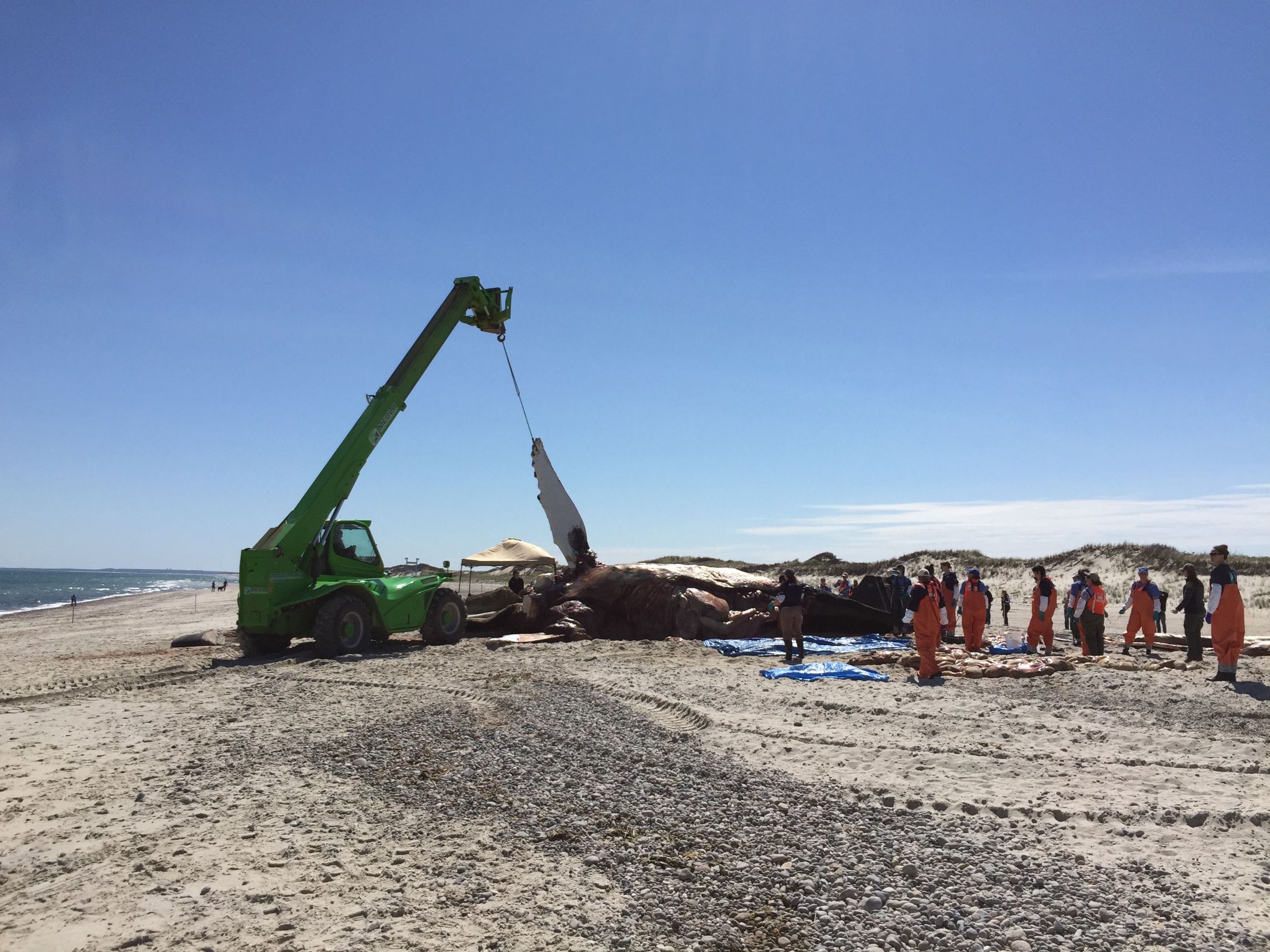
Whales have ears?
They need Vector’s ears.
Humpbacks are baleen whales, a species that has bristly plates instead of teeth, which they use to capture krill, zooplankton, and other small fish. Among the biggest whales, humpbacks patrol all seven oceans, migrating thousands of miles each year. A mainstay of New England’s tourism economy, humpbacks, which migrate between the Caribbean and North Atlantic oceans, delight whale watchers from Maine to Provincetown with their acrobatic jumps and dives. The males among these gentle giants fill the ocean with song—howls, cries, barks, and melodies scientists are working to decipher. They likely use their songs to communicate, navigate, mark territory, and find mates and food. Humpbacks create the most complex songs of all whales, says Ketten. They weigh an average of 40 tons, making Vector pretty typical. Scientists liken their length to a school bus. They have long, wing-like white flippers and powerful flukes, with markings as unique as fingerprints, enabling researchers to track humpbacks through photo identification. But none of these imposing features are as crucial to a whale’s survival skills as the organs that lie under thick layers of blubber, muscle, and bone attached directly to their skull: the ears.
Whales have evolved over millions of years to be able to hear extremely well underwater, using their ears to navigate the vast ocean waters just as humans use their eyes to navigate their homes, streets, and sidewalks. It’s how they get around. One reason that whales hear so well is that they have three to five times more brain cells dedicated to hearing than humans do. Ketten is investigating other possible reasons, as well as figuring out what exactly whales can hear.
Humpbacks, like other whales, are protected under the Endangered Species Act (1970) and the Marine Mammal Protection Act (1973). But unlike North Atlantic right whales, which are critically endangered, the humpback population has been steadily increasing since commercial whaling was banned in 1985. Still, dangers from humans persist: vessel strikes, climate change, plastic debris, and commercial fishing gear, ropes, nets, and traps that entangle whales, wrapping around their tails and necks, constricting their ability to breathe and swim. An unusually high number of humpbacks have died since January 2016 along the Atlantic coast, from Maine through Florida, according to the National Oceanic and Atmospheric Administration (NOAA); although the cause of death has not been determined in most cases, some of the carcasses showed signs of vessel strikes.
And then there is noise. The oceans are naturally noisy places; think of waves, volcanic eruptions, storms, and sounds created by marine creatures. But now there is growing concern about underwater noise pollution—from shipping traffic, construction, seismic air guns used in oil and gas exploration, sonars, and military training—all of it occurring in parts of the sea that are habitats for humpbacks. Little is known about how this human cacophony is impacting these whales. Ketten says the major concern is twofold: Will humpbacks be disturbed by noise pollution that could disrupt their feeding, mating, and other critical behaviors? And will they be exposed to frequent, extremely loud sounds that impair their hearing?
“How much sound are we putting into the oceans, and what is it bothering?” says Ketten, whose authoritative and unflappable charm brings to mind the actress Frances McDormand. “It’s a huge question, because we realize that in some places, like the North Atlantic, we’re creating, essentially, the equivalent of an industrial plant.”
As scientists learn more about how noise pollution is impacting whales like Vector, they can create protections for species like the humpback, for example, by devising alert systems to warn whales away from harm without, as Ketten says, “spooking them.”

In 2000, Ketten helped lead an investigation of the mass strandings, and deaths, of whales in the Bahamas, following the Navy’s use of sonar during training exercises there. Scientists concluded that the exercises disturbed one group in particular—beaked whales. “The nervous Nellies of the sea,” Ketten calls them. “When sonar goes off, they freak and try to run away from it. On the other hand, pilot whales really like sonar—they come up to the ships and they mimic it. So every species is different.”
That mass stranding in the Bahamas helped focus attention on ocean noise pollution and whales.
If Ketten and her team could get their hands on Vector’s ears, and if those ears were in fairly good condition, it could help them learn more about how and what humpbacks hear, and at which frequencies and intensities human-caused sounds become disruptive to their behavior. With that information, researchers could understand which man-made sounds pose the most risk to whales, causing them to swim into areas where they are at greater risk of being harmed or of beaching.
But when it comes to conducting research on whales, there are two significant obstacles for scientists: Finding them. And holding them.
“Their natural environments are huge and three-dimensional,” says Tyler Perrachione, a Sargent College of Health & Rehabilitation Sciences assistant professor of speech, language, and hearing sciences, and associate director of BU’s Hearing Research Center. “And you can’t keep them in a lab like mice or birds or monkeys.”
Then there is what Ketten worries about. Money. Funding for research on whales and marine mammal hearing is tough to come by; the BU team’s latest grant of approximately $500,000 over two years, from the Joint Industry Program, will expire soon. Working out of a cramped lab in a decades-old building on Cummington Mall, where sensitive auditory experiments compete with vibrations from the Massachusetts Turnpike and the clatter from the MBTA’s Green Line, the team can hardly afford to waste time or money on travel and research that might well yield no usable results.
So, before Ketten decides whether they should rush down to the Cape to check out this humpback washing ashore, she needs more information. Shortly after getting the initial email, the first photos of Vector appear in online media and her interest is officially piqued. Pictures of Vector in the water show no obvious decomposition or excessive bloating—conditions that could make research on her difficult, maybe even impossible.
Ketten starts to mobilize.
Race to the beach
On Tuesday, May 7, Ketten hears from Misty Niemeyer, a biologist on the Cape at the International Fund for Animal Welfare, or IFAW, a global animal welfare and protection organization. Niemeyer will oversee the necropsy on Vector. She and her IFAW crew tow Vector from East Sandwich to a bigger beach in nearby Barnstable to accommodate the heavy equipment needed for the necropsy.
Ryan Bemis (MED’03), an emergency room doctor on the Cape, came down to see the roped-off scene at East Sandwich Beach before Vector was moved. He brought his children and snapped a few pictures. “It’s not something my kids would get an opportunity to see very often,” he says a few days later. “I was asking my kids to be quiet. There were kids running around, but a lot of people were trying to treat it like a death, a funeral.”
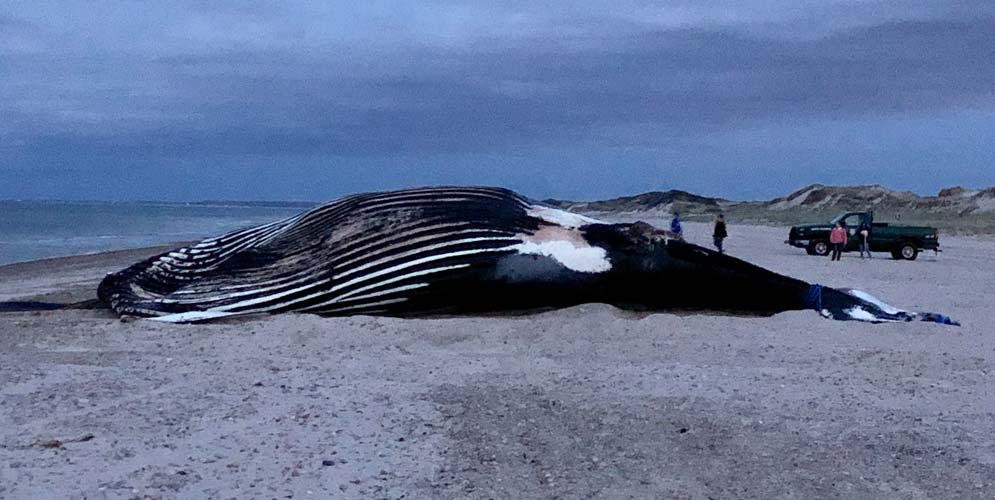
With Vector safely moved to Barnstable, police keep onlookers back because whale carcasses have been known to spontaneously explode from gas buildup. And that’s when Niemeyer shares more encouraging news with Ketten: the initial pictures were accurate—Vector is a “code 3,” lingo for a carcass that appears to be in fairly good condition.
The necropsy is scheduled for first thing Wednesday morning. Ketten already has the required permits from NOAA and National Marine Fisheries Service. If the BU team can drop everything, collect the tools they need, and get to Barnstable by 11 am—when Niemeyer’s team will be ready to remove the head—they can perform the delicate dissection and extraction of Vector’s ears, and bring them back to their BU lab for research.
Now Ketten alerts her team. And she cancels lunch with colleagues from out of town. “You’ve been bumped by a whale,” she tells them.
By 6:45 am on Wednesday, May 8, Ketten is on the road to Woods Hole so she can pick up protective gear and necropsy tools—forceps, scalpels, knives, crowbar, hammer, hacksaw—to get to work on a dead whale weighing roughly the equivalent of 10 Subaru Outbacks.
Her team—a trio of engineers—know they need to move quickly. This is not the first spur-of-the-moment whale necropsy of research engineer Aleks Zosuls (ENG’01). He delayed his honeymoon in 2015 and persuaded his bride to help retrieve the 200-pound head of a beaked whale (Ziphius cavirostris) that had just died. “A pristine specimen,” Zosuls remembers. “We had been waiting for one in this shape since 2001.”
“You never know what will show up when,” he says. “If you can draw some parallels between species in your data collection…you have whale ear bingo.” The data he gleaned from the Ziphius enabled his colleagues and him to estimate the whale’s hearing range.
On the morning of Vector’s necropsy, Zosuls, an ENG instructor in biomedical engineering, is supposed to be proctoring a final exam, but he gets a colleague to cover for him. He’s also supposed to be renovating a house in Cambridge for his wife and himself. But that will have to wait, too.
“I told my wife, ‘Whales take priority,’” Zosuls says with a chuckle.
With Ketten on her way to the Cape, Zosuls collects his own carpentry tools—hammers, saws, chisels—and heads to the lab at BU to meet up with research engineer Graham Voysey (ENG’06’16) and research fellow Andrew Tubelli (ENG’08).
Tubelli combines engineering and modeling to study whales’ hearing, work he got into through his interest in building a robo-lobster. For Tubelli, this will be his second necropsy.
Tubelli is the lead author, with Zosuls and Ketten, of a July 2018 study published in the Journal of the Acoustical Society of America on the range of a humpback’s all-important sense of hearing. Their research is the first step toward understanding how the “whole ear” works for each species of whale, says Tubelli, who created the computer models based on Ketten’s scans of three different humpback ears, as well as Zosuls’ measurements.
It’s the first necropsy for Voysey, who develops software for the team’s research, but as a former EMT, he’s trained to work fast under pressure. His experience as a blacksmith will also come in handy. And if his colleagues need entertainment on the drive to Barnstable, Voysey can recite passages from one of his favorite novels, Herman Melville’s Moby Dick.
Voysey has heard enough about the stench and bacteria that are part of necropsies that he’s lined up a vehicle for the task—“a disposable car,” he calls it. It’s a used one he plans to sell. Voysey has a three-year-old son. “There’s no way I was going to use the car my son rides in,” he says.
Then there’s Darlene Ketten. Trained in neuroanatomy as well as biology, she has spent more than two decades around dead whales, peering inside their heads and ears. (At 5-foot-1, she can practically climb inside.) She estimates she has led, or been part of, 150 to 200 dolphin and whale necropsies. Because humpback necropsies are so rare, she has done only about 15 of them in the past 25 years.
She knows living whales, too; she’s even learned to sing their songs—and will break into one mid-sentence. Decades ago, in graduate school at Johns Hopkins, she pioneered a biomedical scanning technique for whale and dolphin ears that transformed the field. Later, as a clinical assistant professor at Harvard Medical School, she applied that same technique to her research on cochlear implants in humans. Now she is a world-renowned expert on whale hearing, as well as chief scientist and director of the Woods Hole Oceanographic Institution’s Computerized Scanning and Imaging Facility.
Ketten, who is a senior fellow of the National Institutes of Health and a fellow of the American Association for the Advancement of Science, has all but retraced the voyages of old-time whaling, performing necropsies on whales from nearby Nantucket to far-flung Cook’s Island in the South Seas. (The silver stingray charm with a black pearl she wears around her neck is from Cook Islands.) The work is dirty, stinking, dangerous, and highly unpredictable. She recalls the dead sperm whale that washed up on the beach in Nantucket about 10 years ago and appeared to be in good condition. “And then when we went to work on it,” she recalls, “it literally exploded on my research assistant.” (He went to the emergency room with a badly sprained leg).
Having reached inside the carcasses of hundreds of marine mammals, Ketten has “seal finger,” as it’s known, her fingers permanently bent from bacterial infections she picked up from a manatee and a bottlenose dolphin.
No infection could dampen her passion for whales, however. She describes them as “majestic, elusive, charismatic creatures that couple exceptional grace with enormous power,” in a book she contributed to, Hearing by Whales and Dolphins (Springer, 2000). She compares whales’ ability to hear under the immense pressure of ocean water to Ginger Rogers’ dancing backwards in high heels and a cumbersome gown.
When nature and science collide
At 8:30 am, with the trunk of his “disposable car” loaded with tools, Voysey, along with Zosuls and Tubelli, head for the Cape in their cruddiest clothes. They fill a cooler with ice packs, to hold Vector’s ears.
About halfway to the Cape, the team meets up with Ketten, so Tubelli can ride with her to Woods Hole to help her collect the protective gear and more tools. Voysey and Zosuls head for Sandy Neck Beach in Barnstable. It’s around 10:30 am when they get to the beach and check in with Niemeyer. Ketten and Tubelli arrive shortly afterward. It looks like a construction zone and the scene of an accident, all in one.
A Caterpillar tractor, a crane, a bulldozer, and a front-end loader loom over the shoreline. Niemeyer has enlisted some 50 people to help with the necropsy—scientists, volunteers, local police, and officials from NOAA, National Marine Fisheries Service, and the Barnstable Department of Natural Resources.
On the other side of the roped-off area, a small crowd has gathered to pay their respects to Vector. Reports of Vector’s death have been circulating among whale-watching expedition companies and their passengers, from Maine to Cape Cod to Canada. (Vector spent much of her time in the North Atlantic in the Bay of Fundy.)
“She was a favorite of mine—heartbroken,” Chelsea Pugh posted on the Bay of Fundy Brier Island Whale and Seabird Cruises Facebook site.
“RIP Vector,” Eileen Cole posted on the same site. “You will be missed in the Bay.”
A team of researchers from the Center for Coastal Studies is collecting tissue samples from Vector that will help them learn more about her reproductive history, aging, hormones, and the environment in which she lived and died. More than two dozen other scientists are also there—from IFAW, the New England Aquarium, Marine Mammal Alliance Nantucket, the Massachusetts Division of Wildlife and Fisheries, the College of the Atlantic, and elsewhere—wielding long knives, surgical scalpels, saws, and chisels. They also have plastic buckets, bags, and containers to hold tissue samples. Some scientists will be searching for a cause of death. Others will be studying Vector’s intestines and her heart. A researcher from the College of the Atlantic will eventually haul Vector’s skeleton, in pieces, back to Maine, where it will be reassembled and displayed for educational purposes.
Ketten, Voysey, and Zosuls pull on high rubber boots, protective overalls, two pairs of surgical gloves, face masks, hats, and safety glasses. Tubelli, who is also a scientific illustrator, is designated “the clean person,” charged with bagging the tissue samples they collect and taking notes and photographs.
Niemeyer’s crew uses heavy equipment to expertly remove Vector’s enormous head, placing it upside down in the sand so that Ketten and the other BU scientists can get to work. Ketten’s team lays out a plastic sheet and sets up two buckets, one for clean tools, and another for dirty or contaminated ones.
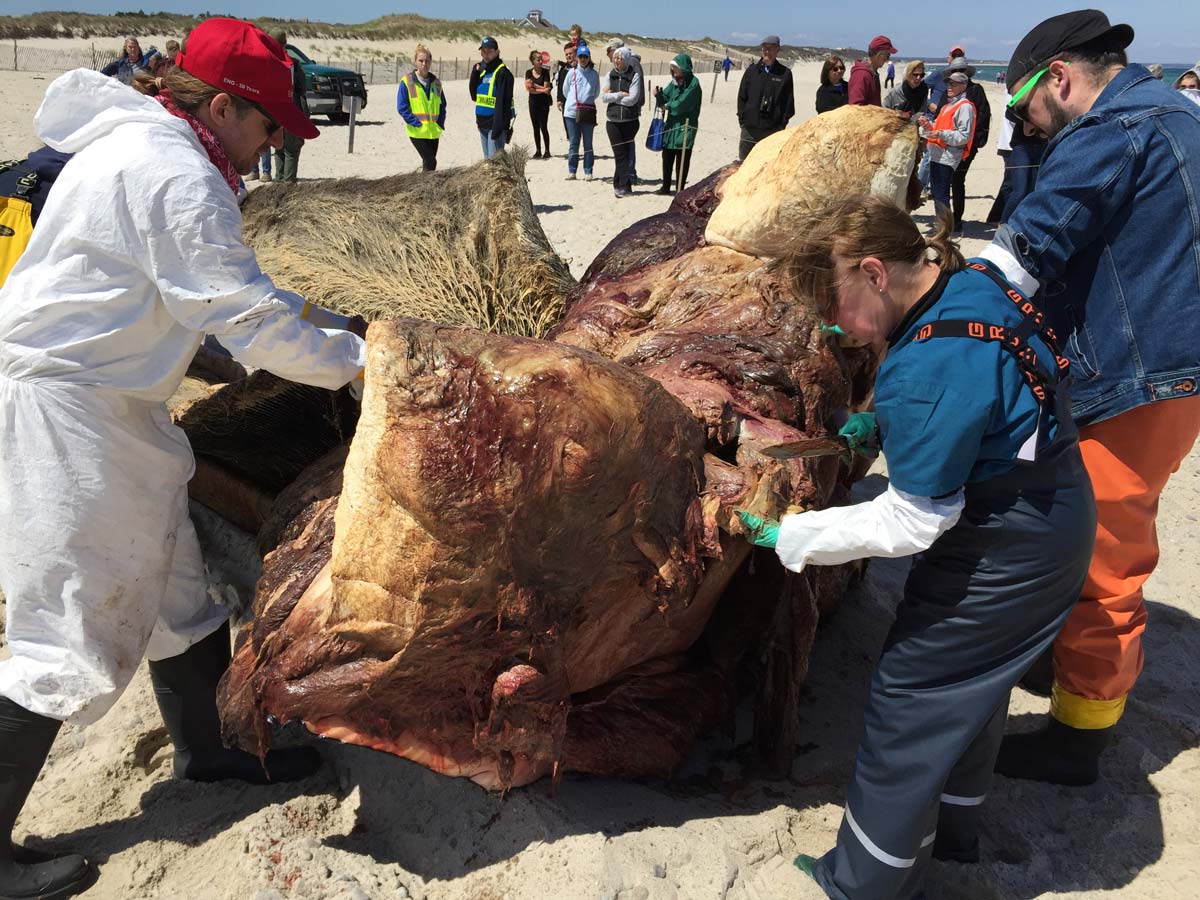
They will be working on slippery sand. Ketten gives her standard warning: When you are not cutting tissue, keep your blade pointed down. Then she shows them where they will be cutting.
“The biggest risk is slipping, because it’s oily,” Ketten explains. “You start getting really tired and you get sloppy and you slip with a knife—I’ve seen some very nasty accidents.”
She begins by probing with her hands around knobs on the base of Vector’s skull to find the right spot. She uses a long scalpel to reveal the surface of the right ear. Then she shows the team how to locate the other ear.
Voysey picks up a 9-inch chef’s knife. The pressure is intense: If they break an ear—and that’s easy to do—the samples are ruined. Voysey begins by slowly removing the soft tissue around the left ear.
Zosuls helps, removing the tissue with a carving knife until they can see the bone that surrounds the ear. Voysey moves to the right ear, collecting tissue samples, just as Zosuls is doing with the left ear. Transmittable bacteria from the whale are always a risk. “You have to clean and sanitize everything,” says Voysey. The team collects the tissue in a pile on the beach so they can dispose of it afterward.
As delicate as the ears are, in the end, the only way the team can free them is to break the bone with hand tools. Once the ear bones are exposed—and Tubelli has photographed them—Voysey picks up a chisel and a hammer.
He talks through each step with Ketten and Zosuls, just like a surgeon might do in the operating room.
“I’d ask a couple questions about the anatomy, propose a course of action or a theory, discuss it with them, and then keep going,” Voysey says later. “Sometimes they’d point out a bad idea or a particularly delicate area. Sometimes I’d make a suggestion about switching a tool based on how the bone was responding.”
Tubelli is taking photographs when he spots something: the ear’s wax cap. Ketten, the veteran of whale necropsies, knows what a find this is. “The eardrum is very hard to get into and on top of that is a wax cap which is essential and which you almost never get to see,” she says. “Once I saw the wax cap, I knew this was a really great ear and I wanted to get it to the scanner.”
Voysey breaks one ear free of the bone. Then he and Ketten team up to extract it using a pry bar. Voysey is keenly aware of the risk that the bony structures of the ear might crack in half while they are using the pry bar to free the ear from the skull. “I was paying very close attention to where my hands were,” he says. “Strandings of humpback whales are rare. I didn’t want to squander the opportunity.”
And then, just like that, after about two hours of effort, Voysey pops off the right ear. Ketten is there to catch it. Next Ketten and Zosuls extract the left ear, and then Tubelli carefully places the ears in heavy-duty plastic bags so they can pack them in ice packs in the cooler, and load them into Voysey’s car.
x
A member of the International Fund for Animal Welfare (left), which organized the necropsy, working on Vector’s head while BU scientists Graham Voysey, right, and Aleks Zosuls extract the ears. Photo by Andrew Tubelli
x
Andrew Tubelli standing behind the upper half of Vector’s head, with baleen and soft palate visible. Photo by Graham Voysey
x
Andrew Tubelli next to ribs and scapula from the whale, with a member of the International Fund for Animal Welfare team working on the whale carcass in the background. Photo by Aleks Zosuls
x
The beached whale carcass was towed from a beach in East Sandwich to Barnstable, Mass., for the May 8 necropsy. Photo by Andrew Tubelli
It’s early afternoon. Niemeyer’s crew will continue their work on the necropsy into the evening. The BU team had extracted both ears in just three hours; more often it can take five to seven hours to remove a single ear, says Ketten.
But there is no time to celebrate. Ketten heads for her lab at Woods Hole so she can start preparing to scan the ears; the images will provide a map for the experiments Zosuls will conduct on the ears in the lab at BU.
Vector’s ears have greatly increased the team’s sample size and certainty that they have representative ears for the species. “One specimen [alone] is not reliable because it is from a wild animal that could be odd for the species, or even have been deaf because of some anatomical abnormality,” says Ketten.
But because so much is already known about Vector, these ears come with almost 40 years of well-documented history. With Ketten and Tubelli going ahead to Woods Hole, the others stop on the way there to pick up a pizza.
Vector’s legacy
By 7 pm Wednesday, four days after Vector’s carcass was spotted in Cape Cod Bay, the ears are back in Boston, in the lab on Cummington Mall. Zosuls, who also works in BU’s Center for Space Physics helping to build satellites, has improvised many of the tools in the lab that the team uses to study whale ears. These are not the sort of tools you find at Home Depot. Zosuls, who once built a battery-powered piano with keys made from staplers, has fashioned his own unique set of gadgets for precisely this sort of work.
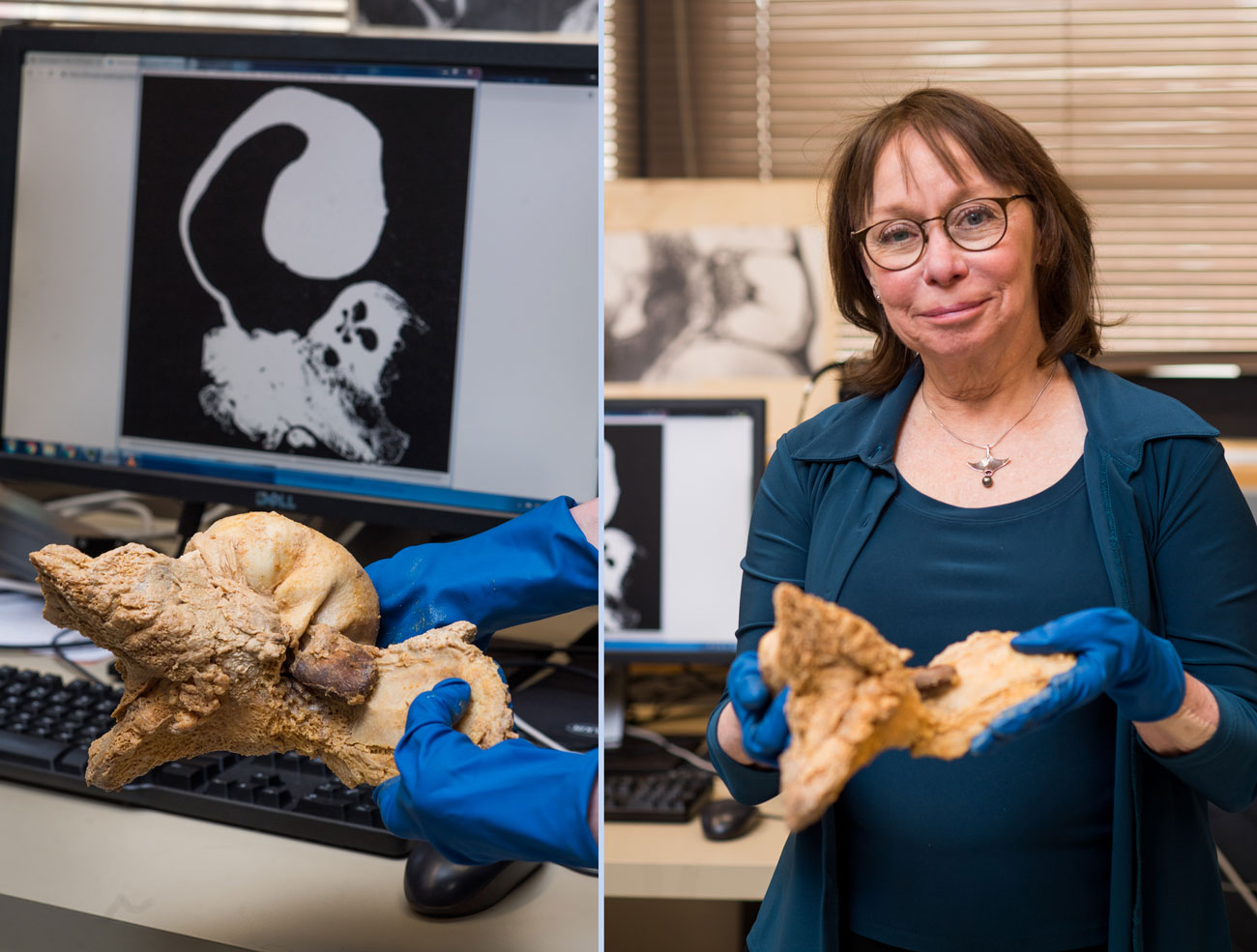
His first task is to mount the ears on a metal stand so he can measure them. It has to be done securely, to avoid vibrations.
It sounds simple, but it isn’t. The ears are so slippery and irregularly shaped, he is unable to mount them with Krazy Glue or anything else on hand.
“Sometimes you win,” says Zosuls. “Sometimes you don’t.”
He puts the whale ears in a refrigerator in the lab and calls it a night.
Zosuls says he gets his best ideas while he’s rowing on the Charles, or in the shower, or after midnight. At home that night, he’s thinking about what he could use to mount Vector’s ears and up pops an idea: Bondo. “I use Bondo for fixing car fenders,” he says of the putty. He has some in his garage.
Early the next morning Zosuls is back in the lab with the Bondo and a pair of steel brackets. Bingo, the Bondo works.
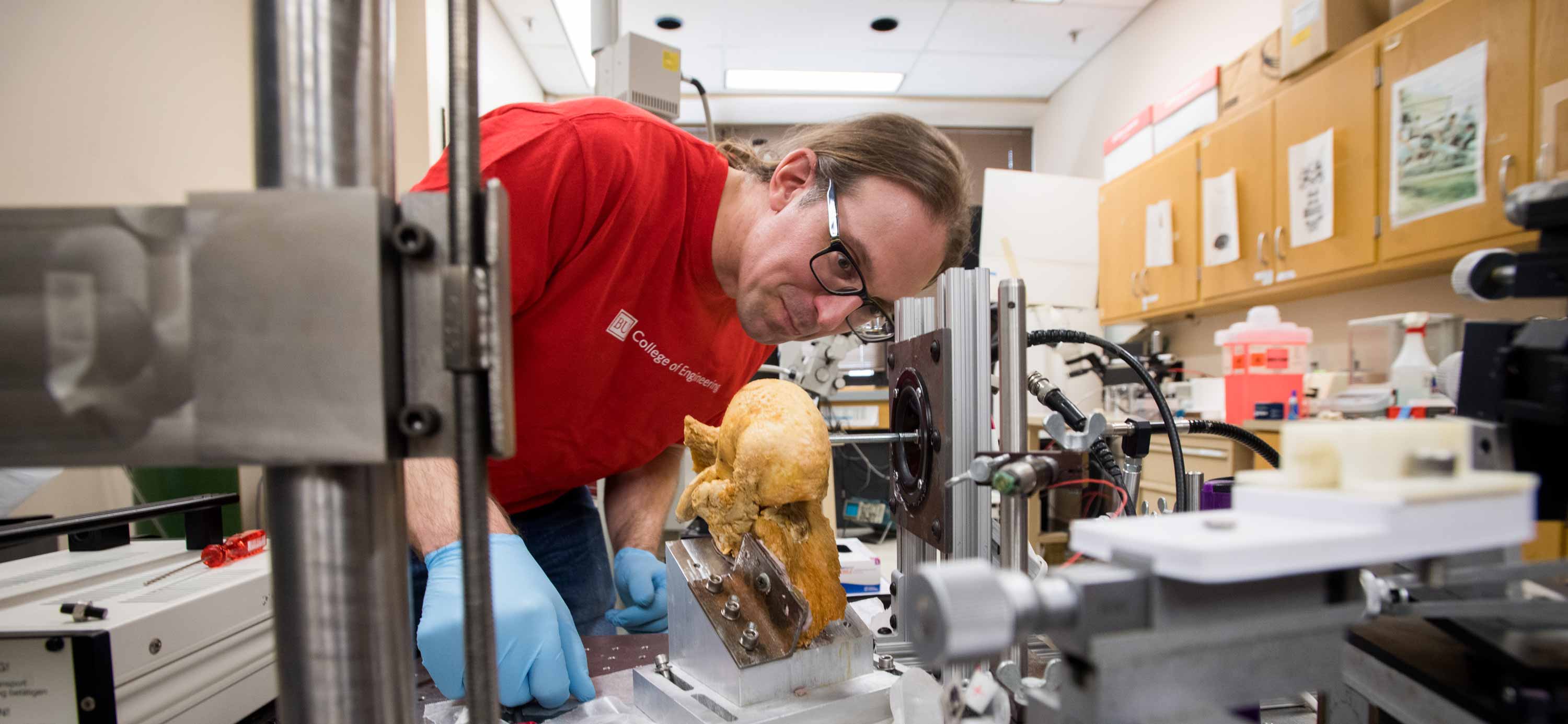
He measures the ears. They are 7.5 x 4.7 x 3.1 inches, the size of a small watermelon, and they weigh 2.7 pounds apiece. The data he begins to collect from the middle portion of Vector’s left ear confirms what Zosuls has learned from other whale ears he’s measured over the last 11 years: baleen whales (including humpbacks) are more sensitive to low-frequency sounds than toothed whales. This demonstrates the need for scientists to understand species’ hearing differences and design devices that produce “alert” signals—which is just one of many solutions experts are considering—that could help various species avoid ship strikes and harmful ocean noise pollution.
Zosuls works through the weekend, running experiments on the ears. The team wants to better understand how sound travels to the cochlea, the spiral-shaped part of the inner ear that sends sound to the brain. It’s all part of the researchers’ work at better understanding what whales hear and how they do it so well far beneath the ocean’s surface.
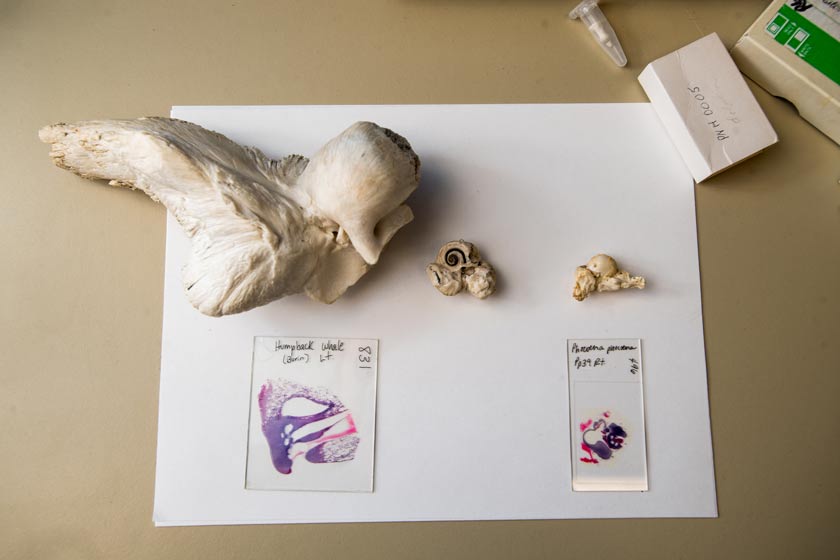
Word has gotten out among other scientists at the Hearing Research Center, including associate director Perrachione, and they are excited about this rare research opportunity.
“Who would even think that whales had ears?” says Perrachione. “But of course they do.”
Perrachione stops by the lab Friday morning to see Vector’s ears. “Can you imagine what it’s like to swim the whole ocean primarily by listening?” he says. “Imagine navigating through Boston by sound alone.”
As it turns out, Vector’s ability to perform the Ginger Rogers–like dance of survival that Ketten wrote about may have been limited in some way. Ketten has picked up a clue from the scans confirming what she first noticed during the extraction on the beach: Vector had a mild ear infection. “She may have had some hearing impairment that could have had something to do with her overall condition,” she says. There are no signs Vector was hit by a ship, but if she had difficulty hearing, she might not have been able to get out of the way of an oncoming ship.
Or, says Ketten, she may have had some trouble communicating with the rest of the pod.
Niemeyer, the necropsy coordinator, says scientists may have to wait months to learn Vector’s cause of death. As is often the case, they may never find the reason. And the reason, if they do find one, may be unrelated to human activity. “These are wild creatures and there are all kinds of death—everything from ectopic pregnancies to pneumonia,” says Ketten.
Almost a month after the beach necropsy, Vector’s ears continue to deliver a treasure trove of data for the BU team.
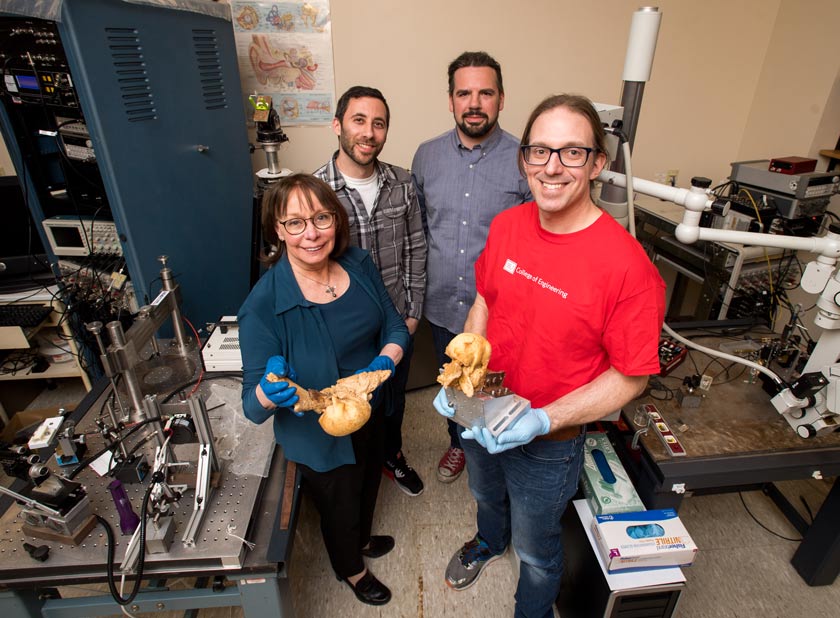
Photo by Cydney Scott
For the team, one race is behind them, but another lies ahead. Their funding for this research? It runs out in September. Ketten is already scrambling for additional support.
But no matter what happens next, Vector’s contribution to science—and Vector herself—will live on. All the samples collected at the necropsy by Ketten’s team, and the other researchers, will help tell a rare and unusually detailed story of one humpback’s life, says biologist Jooke Robbins, who directs humpback whale research at the Center for Coastal Studies.
And there’s more. One of Vector’s offspring, named Bowline, whom researchers first observed as a new calf with his mother in 2007, is already being tracked by Robbins’ team, and captivating a new generation of whale watchers off the coast of Cape Cod.



Comments & Discussion
Boston University moderates comments to facilitate an informed, substantive, civil conversation. Abusive, profane, self-promotional, misleading, incoherent or off-topic comments will be rejected. Moderators are staffed during regular business hours (EST) and can only accept comments written in English. Statistics or facts must include a citation or a link to the citation.